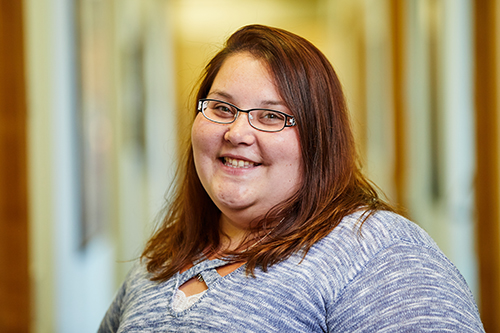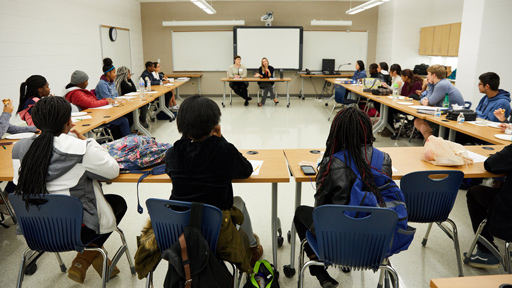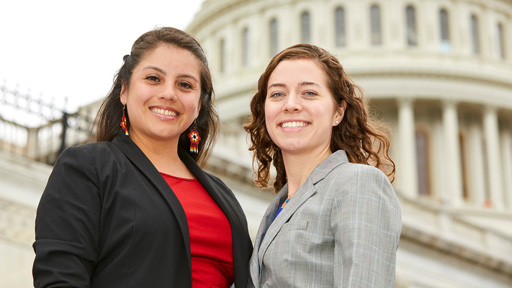Strengthening the Policy Workforce
The National Human Genome Research Institute (NHGRI) and the American Society for Human Genetics (ASHG) are committed to strengthening the workforce of policy makers and analysts with genetics professionals who want to learn how to create the guidelines for how we safely and effectively use genomics in the clinic.
The NHGRI-ASHG Genetics and Public Policy Fellowship prepares scientists for careers in science policy through three different rotations: experience working with ASHG in the non-profit sector; a stint as Congressional staff on Capitol Hill, and a rotation in NHGRI's Division of Policy, Communications and Education.
The 2017-2018 fellow, Nikki Meadows, Ph.D., has just finished her first rotation here at NHGRI. Learn about her experiences and what motivates her to pursue a career in science policy.

Tell me about your rotation at NHGRI? What have you been working on since arriving?
One of the big things I worked on during my rotation was helping to write about the goals and accomplishments of a few of NHGRI's programs as part of the institute's Congressional Budget Justification for 2019. This is part of a document that is delivered to Congress to outline the budget requests for Fiscal Year 2019.
Why did you apply to the NHGRI-ASHG Genetics and Public Policy Fellowship?
I applied to the fellowship because, as a grad student, I fell in love with this space that existed between policy and science. I was working in policy as a graduate student advocate for the student society and at the same time I was working on research that had very strong implications for existing public health policy. From that, I started to realize that there was this space in which to do both research and policy.
What's the strangest or most interesting thing you did as a graduate student?
Student politics! During that time, I did things I never thought I would do -- I stood out in the middle of a snow storm for a protest, I had to learn how to work with lawyers and how to talk about budgets and financing. It was a completely different world for someone who was trained in science, but it opened up a new world for me, too.
As a kid, what did you want to be when you grew up?
The first thing I knew I wanted to be was a paleontologist. Then I wanted to be a teacher. And then I wanted to be a lawyer - and somehow, I landed in a space that contains aspects of all three of those things in a way that I didn't know existed. I liked the science part of paleontology, learning things that nobody knew before. Then I realized I didn't like dirt!
What's your favorite nucleotide?
Guanine. It just sounds cool!
Who is your science idol?
I like amazing lady scientists who pioneer and do unique things they're passionate about no matter what anybody else says. They're trailblazing. They're willing to step in where no one else has been before. Lately, I think Marie Curie is awesome. She has two Nobel prizes in two different fields and trained her daughter to be an amazing lady scientist as well!
Where are you going next and what will you be working on?
I am going to Congresswoman Louise Slaughter's (D-NY) office. The portfolios that I'll be working on are genetic policy in a post-GINA world. [GINA stands for Genetic Information Nondiscrimination Act. It was passed in 2008 and prohibits genetic discrimination in employment.] But there are some areas in GINA that could be expanded upon. She has an interest in doing that. I'll also be contributing to the education portfolio for the office. Rep. Slaughter is passionate about STEAM (Science, Technology, Engineering, Arts, and Mathematics) education. I have a minor in theater arts, so it's a nice fit. By taking on these portfolios, I'll be working on background research or information that she needs for any legislation that comes through.
What are you most excited about for your next rotation?
Just soaking it all in. I think it's a very big, very different world from where I've already been. These are real people that are doing the types of things that you read about in the newspaper and see on the news. I'm thrilled to get to work with them and get to know in the political system better. And, my new office has a great view of The Capitol!
Read more: The NHGRI-ASHG Genetics and Public Policy Fellowship




